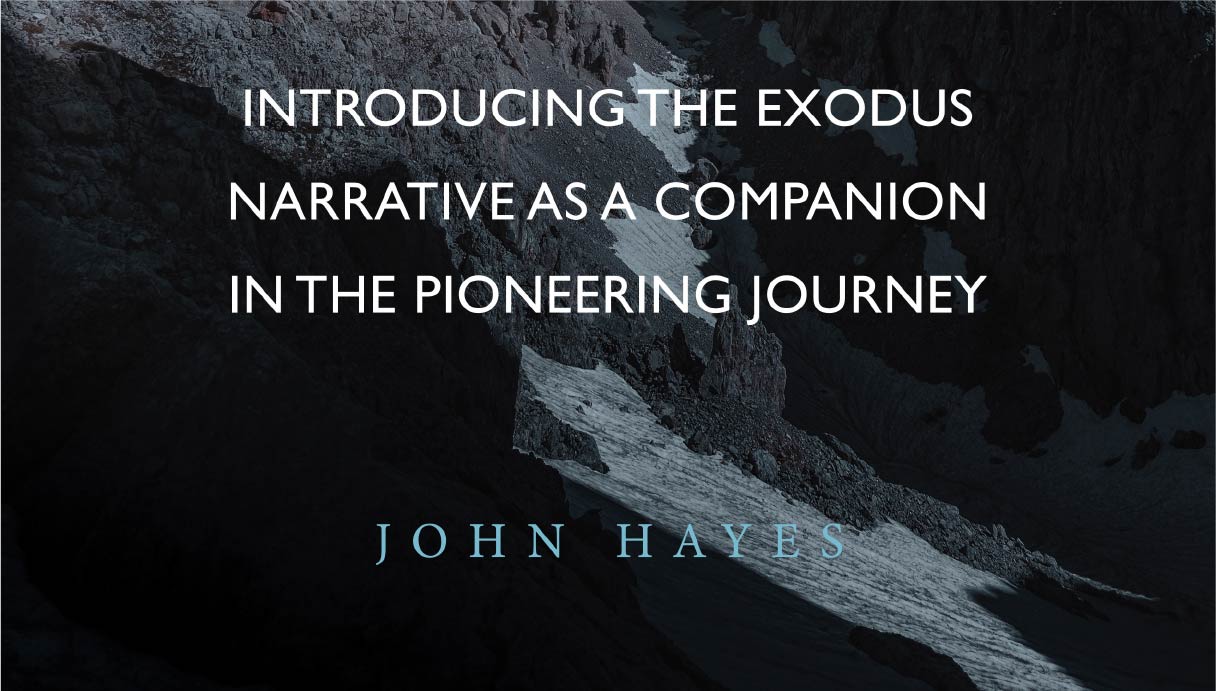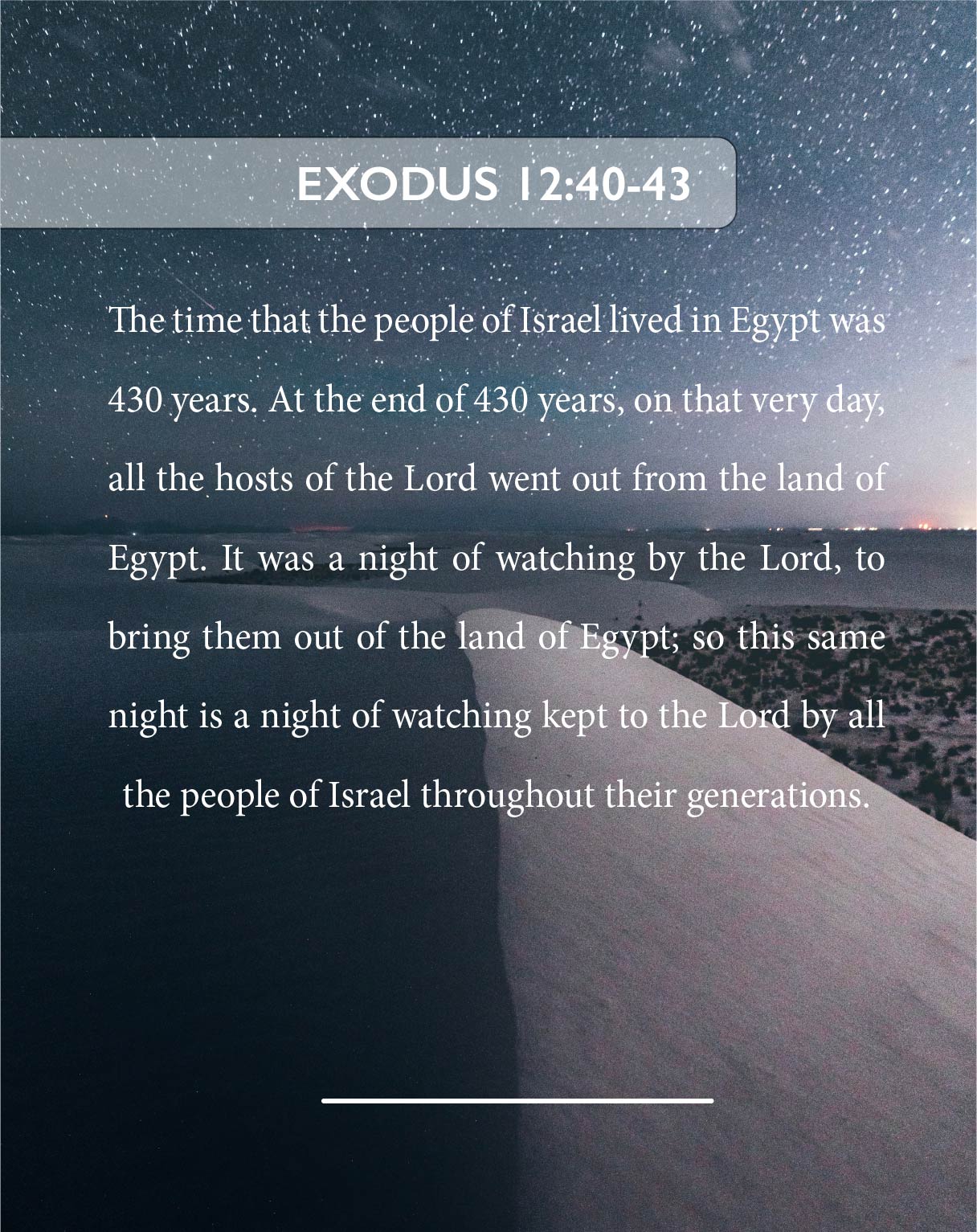


In a few simple words, Exodus 12 beautifully describes the people of God, sleeping safely under the watchful eye of the Lord. The fact that they pass their first night of freedom out under an open sky is especially moving because they have been under the boot of Pharaoh and countless ceilings of oppression for more than 400 years.
Imagine the beauty of this scene for a moment. Perhaps cooking fires are still lit to ward away the darkness as the people huddle together and prepare to sleep in a makeshift tent city. Stretching as far as the eye can see, those campfires mirror the stars above. Most of the Hebrews will have some form of shelter, knowing the journey ahead will be long and difficult. Under Pharaoh’s dominance, few will have had reason to pitch a tent and camp out in their lifetimes. And few will have been free to experience a night in the open air without being under the constant surveillance of the Egyptian authorities.
They are a people unused to freedom. In fact, they are a people unused to mobility. Certainly, as former slaves, they are unaccustomed to making choices, let alone making life choices. Imagine their joy and wonder at being free at last. Imagine their awe as they recall the supernatural acts God used for their deliverance.
They are on the threshold of a long journey that will stretch forty years. It is a journey of great purpose that will bring healing, forge identity, generate intimacy with God, and confirm them as a light to all peoples. But at the start, these important features of the journey may only be dimly appreciated.
But surely there is excitement. And hope. Almost certainly there is anticipation at stepping toward a land of promise. But likely there is also apprehension as they prepare to move into the unknown. Egypt may not have been home, but at least it has been known for more than 400 years.
But there is something else here. In this night of “firsts” there is a quality of innocence, worth pausing to savour, because it is fleeting. The people are pre-journey and have not experienced the highs and lows of the walk of faith ahead. They have not yet gotten into the pattern of journeying a few miles, encountering hardship or tedium, and complaining to Moses, often with sarcasm. Similarly, they have not yet fully experienced the grace of a leader who listens and intercedes for them with the Lord. In turn, they have not experienced the pain of God’s reproach or the jubilation of his redemption.
Instead, in this first night described in Exodus 12 there is the embryo of possibility. The sky above them is wide open and the night is unstained by failure and unwritten by action. However, as time passes, despite the daily presence of God as a pillar of cloud by day and fire by night, the people will often feel alone and fearful and the sky overhead will seem as empty as the desert stretching below. As pioneers in mission, it is important to remind ourselves the journey will be both beautiful and difficult. There will be moments we feel God’s presence. There will be moments we do not.
OPEN SKY OR EMPTY SKY?
There is another way to read Exodus 12:40-42. It is possible that the night of watching described here refers back to the Passover night, itself, not the first night camping out under the stars. In fact, that may be the more likely interpretation. But either way, the point of this short passage is clear. This night spoken of, as well as all the nights that followed, is more about God than it is about the liberated Hebrews. “It was a night of watching by the Lord,” the text assures us. Like a new parent hovering over the edge of a crib, God looks down on a people not only newly liberated but also newborn. They are a people he has chosen specially and promised, “I will take you to be my people and I will be your God” (Exodus 6:7).
This small moment in the Exodus narrative, the night of watching by the Lord, is easy to overlook because of the drama that lies in the journey ahead. For myself, I found I had new eyes for this passage when my first child was born and I found myself night after night, hovering at my daughter’s crib, in protective wonder.
GOD WITH US
Why is this important? For those of us privileged to start new teams in marginalized and oppressed communities it is critical that we notice and appreciate God’s abiding presence right from the start. We are called to serve as laborers in the harvest, but even before that, we are called simply to be with God, and to recognize that he is with us. In the same way that this intimacy with God is a foundation in the Exodus story, Mark 3:14-15 tells us: “And he (Jesus) appointed twelve whom he also named apostles, so that they might be with him and he might send them out to preach and have authority to cast out demons.”
Pioneering mission can become a blur of activity and require rigorous learning and costly sacrifices. If we have not made a habit of “fixing our eyes on Jesus” before we enter the ministry, we may gradually shift our gaze to focusing on ourselves and our efforts. Consequently, like the people of Israel journeying across the desert, if we encounter unexpected hardships or see our efforts yield little immediate fruit, we can build up resentments against God, the church, or our neighbors.
Likewise, my experience as a dad with a newborn daughter helped me see my first night on Minnie Street in April 1985 with fuller awareness. I found myself wide-awake at 3:00 in the morning with anticipation and some apprehension for the day ahead. I turned to Numbers 13 to study the Hebrews’ first effort to “scout the land.” With that text in my head, I ventured out on Minnie Street to observe and prayer-walk the community. I didn’t know “how” to prayer walk and had never seen anyone do it. So, it is possible that in my inexperience and insecurity as a young missionary, I was more focused on what I was supposed to do than on God who was with me. Nevertheless, night prayer walking became a weekly habit for me during that season.
I chose nights to pray because they minimized distraction. At that time, Minnie Street was the most congested street in California, and to prayer walk during the day, as the only white resident among thousands of Asian refugees and Latino migrants would have been next to impossible. And it is also possible I chose nights to prayer walk because I was stepping out in faith in an exploratory way, and the darkness covered up potential mistakes. Prayer walking late at night also brought me face to face with dealers, addicts and others who were the most broken and vulnerable of our community.
In hindsight, especially after reading Exodus 12, I realized that God chose nights for me to prayer walk more than I did. I believe he wanted me to join him in nights of watching. He was watching over me, definitely, but also over neighbors who would journey with me in faith and discovery in the years ahead. I intuited this at the time, but I wish that I’d appreciated his watchful presence more.

The “night of watching by the Lord” is meant to become a “night of watching to the Lord” by the people in a mutual covenant of intimacy stretching into the future. How can we do this? On Minnie Street, I started a life-long process of connecting with God most mornings and nights. About a year into that process, I realized I was sensing so much from the Lord in conversational prayer and study that I began to keep a journal. I was so intent on listening and learning from Jesus of the gospels that when I opened the Word of God I felt I was opening a door into a deeper and more powerful reality.
It is important at the outset of your journey as an apostolic missionary to take stock of your dependence on, and appreciation for, the Lord Jesus, as Immanuel, or “God with us.” Furthermore, the forty-year journey of the Hebrews can only be fully understood in the context of Jesus’s re-enactment in forty days of testing, trial and triumph in the wilderness. Pioneers are often so eager to get on with the work of doing justice and mercy as prophets and missionaries of Micah 6:8 that they under-appreciate the need for the contemplative dimension of “walking humbly with our God.” There is never a “bad time” to realize the fullness of our dependence on Jesus as branches of the vine, but we can spare ourselves, team members, and our neighbors some heartache and confusion if we bring a developed and personal sense of practicing the presence of God with us into the ministry journey. It is better not to wait until adversity drives us backwards.
It is also important to note in Exodus 12 that right at the beginning of the journey, God instils in the Hebrews a habit of celebrating the significance of certain days or events. The journey across the desert was marked with celebrations—writing songs, building memorials, and marking special days. Pioneering new teams in the world’s margins is especially rigorous in the first two years. There will be times of bewilderment, but also of rejoicing. There will be times of loss and others of gain. Therefore, it is good to take an “attitude check” right at the start and kindle a habit of celebrating the good moments as well as the “God moments” when God reveals himself in unmistakeable ways.
I want to welcome you to an international community of followers of Christ and practitioners among people in poverty. It is a privilege to be Christ’s ambassadors, especially among those the world has made last, but God has made first. The apostle James tells us: “Listen my beloved brothers, has not God chosen those who are poor in the world to be rich in faith and heirs of the Kingdom, which he has promised to those who love him?” (James 2:5) Matthew 25 goes further to say that Jesus identifies specially with those in need.
This is a journey that will require a lot of individual faith, courage, and resilience. But it is also one that is best made, and is most sustainable, as a tribe. We remember that the forty-year journey of the people of Israel was made as twelve tribes. We are grateful for your presence among us, and we count it a gift to be able to assist you as we step out in faith together as brothers and sisters of the tribe of InnerCHANGE.
May the Lord bless and keep you.

Download Open Sky PDF




